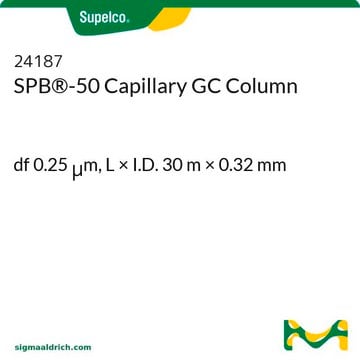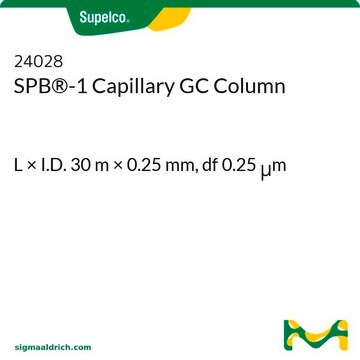28467-U
SLB®-5ms Capillary GC Column
L × I.D. 30 m × 0.25 mm, df 0.10 μm
Synonym(s):
GC column, SPB-5, 5% diphenyl, mass spec
About This Item
Recommended Products
material
fused silica
Agency
Standard Method 6040D
EN 2005/108/EC
EPA 610,625,8015,8082,8100,8141,8270,OLM04.2 SVOA
EPA TO-13,IP-8,8270,525.2,608.1/608.2,608/8081/OLM04.2 PEST
JMHLW
NIOSH 2530,5503
OSHA 62
meets requirements for USP G27 and G36
suitable for EPA 1613
reg. compliance
FDA LIB 4423
parameter
-60-340 °C temperature (isothermal)
-60-360 °C temperature (programmed)
Beta value
625
df
0.10 μm
technique(s)
GC/MS: suitable
gas chromatography (GC): suitable
L × I.D.
30 m × 0.25 mm
matrix active group
Bonded and highly crosslinked; silphenylene polymer virtually equivalent in polarity to poly(5% diphenyl/95% dimethyl siloxane) phase
application(s)
agriculture
chemicals and industrial polymers
cleaning products
clinical
cosmetics
environmental
flavors and fragrances
food and beverages
forensics and toxicology
industrial hygiene
life science and biopharma
personal care
petroleum
pharmaceutical (small molecule)
column type
capillary non-polar
Looking for similar products? Visit Product Comparison Guide
General description
USP Code: This column meets USP G27 and G36 requirements.
Phase:
- Bonded and highly crosslinked
- Silphenylene polymer virtually equivalent in polarity to poly(5% diphenyl/95% dimethyl siloxane)
- ≤0.32 mm I.D.: -60 °C to 340 °C (isothermal) or 360 °C (programmed)
- ≥0.53 mm I.D.: -60 °C to 330 °C (isothermal) or 340 °C (programmed)
Application
- An improved method for cyanide determination in blood using solid-phase microextraction and gas chromatography/mass spectrometry.: This study presents an enhanced method for determining cyanide levels in blood, employing solid-phase microextraction combined with gas chromatography/mass spectrometry. This technique improves sensitivity and accuracy, essential for toxicological and forensic analysis (Frison et al., 2006).
- Photochemical production of conjugated linoleic acid from soybean oil.: This research explores the photochemical production of conjugated linoleic acid (CLA) from soybean oil. The study utilized gas chromatography for the analysis of CLA, demonstrating an efficient method for producing this valuable compound with potential health benefits (Gangidi & Proctor, 2004).
- Development of a solid-phase microextraction GC-NPD procedure for the determination of free volatile amines in wastewater and sewage-polluted waters.: This work describes the development of a GC-NPD procedure using solid-phase microextraction for detecting volatile amines in wastewater. This method offers improved detection limits and specificity, which are critical for environmental monitoring and water quality assessment (Abalos et al., 1999).
Other Notes
Legal Information
Choose from one of the most recent versions:
Already Own This Product?
Find documentation for the products that you have recently purchased in the Document Library.
Articles
Sigma-Aldrich presents an article about the analysis of melamine and related compounds in dog food with the use of more economical gas chromatography-mass spectrometry (GC-MS) instrumentation.
Related Content
This page is intended to make it easier to find the consumables you need based on the analytical method you’re using. Methods included on this page come from the EPA, Standard Methods and ASTM.
This page is intended to make it easier to find the consumables you need based on the analytical method you’re using. Methods included on this page come from the EPA, Standard Methods and ASTM.
This page is intended to make it easier to find the consumables you need based on the analytical method you’re using. Methods included on this page come from the EPA, Standard Methods and ASTM.
This page is intended to make it easier to find the consumables you need based on the analytical method you’re using. Methods included on this page come from the EPA, Standard Methods and ASTM.
Our team of scientists has experience in all areas of research including Life Science, Material Science, Chemical Synthesis, Chromatography, Analytical and many others.
Contact Technical Service




